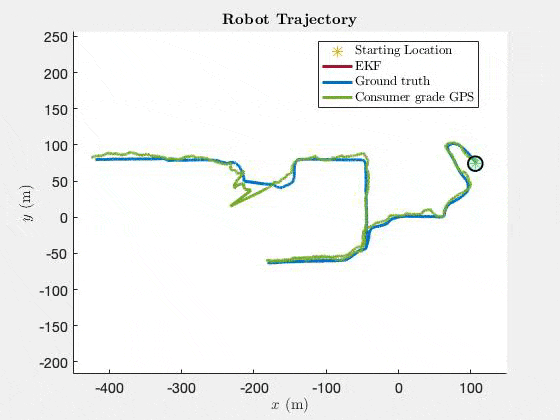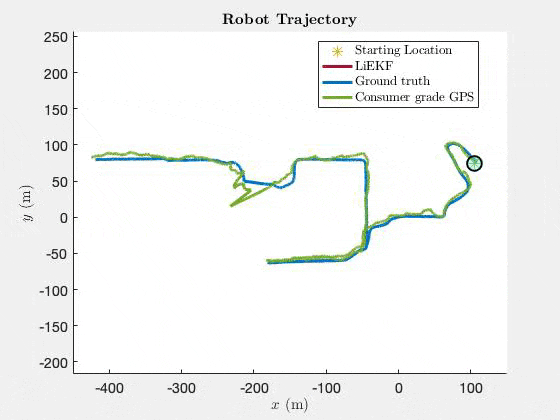Invariant Extended Kalman Filtering for Robot Localization using IMU and GPS
NA 568 Final Project Team 16 - Saptadeep Debnath, Anthony Liang, Gaurav Manda, Sunbochen Tang, Hao Zhou
This project aims to implement an In-EKF based localization system and compare it against an Extended Kalman Filter based localization system and a GPS-alone dataset. We will use the UM North Campus Long-Term Vision and LIDAR dataset, an autonomy dataset for robotics research collected on the University of Michigan North Campus. It consists of data from several sensors including planar lidar, omnidirectional camera, IMU, and GPS.
Goals
- Research done by A. Barrau et al., M. Barczyk et al. and R. Hartley et al. were used as the baseline for the results anticipated from the project.
- Develop an In-EKF filter model for pose estimation on the IMU sensor data from The UM North Campus Long-Term Vision and LIDAR Dataset and using GPS sensor data to implement a correction model.
- Develop an In-EKF filter model including IMU bias (to estimate and reduce accumulated error in IMU measurement) for pose estimation using IMU and GPS (for correction) data.
- Develop an EKF based pose estimation model using IMU and GPS (for correction) data.
- Compare the proposed In-EKF based localization system with the EKF based localization, only GPS data and the ground truth poses provided by the dataset.
Dependencies
-
Download sensor data and groundtruth.csv from the NCLT dataset for a date, save all csv files in one folder named by the date, and store the folder in
/data. -
Run the script
/utils/read_data_and_convert_to_mat.py
Running the code
/src/LIEKF_example.mruns the Left-Invarriant EKF on the NCLT, and compares with ground truth./src/madgwick_example.mruns the Madgwick algorithm./src/EKF_example.mruns the Extended Kalman Filter on the NCLT, and compares with ground truth./src/LIEKF_example_wbias.mruns the Left-Invariant EKF including IMU bias on the NCLT, and compares with ground truth.
/src/LIEKF_example.m, src/LIEKF_example_wbis.m and /src/EKF_example.m produces three plots; planned robot trajectory compared with the ground truth, comparison of the computed euler angles with the ground truth and Mahalanobis distances for the predicted robot states.
Results
Plot generated for EKF

Plot generated for LI-EKF

Check the proposal, final report and video presentation for more details on implementation.
Team Members
- Saptadeep Debnath (saptadeb@umich.edu)
- Anthony Liang (aliangdw@umich.edu)
- Gaurav Manda (gmanda@umich.edu)
- Sunbochen Tang (tangsun@umich.edu)
- Hao Zhou (zhh@umich.edu)